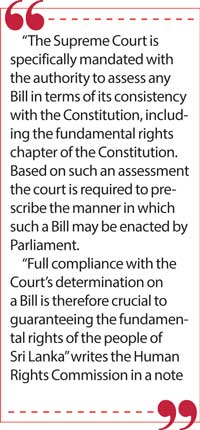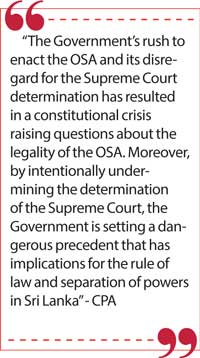Wednesday Feb 18, 2026
Wednesday Feb 18, 2026
Wednesday, 14 February 2024 00:10 - - {{hitsCtrl.values.hits}}

OSA - newest weapon in Govt.’s arsenal to suppress freedom of expression and dissent
By Faraz Shauketaly with David Browne in London
 Sri Lanka’s beleaguered Government, amidst fighting a faltering economy and battling to increase state revenue is now facing a barrage of criticism after bringing into law the Online Safety Act (OSA). Amnesty International Sri Lanka called it an ‘additional weapon’ in the hands of the Government. Late last week Sri Lanka’s Justice Minister acknowledged deficiencies and called for all-party consultations.
Sri Lanka’s beleaguered Government, amidst fighting a faltering economy and battling to increase state revenue is now facing a barrage of criticism after bringing into law the Online Safety Act (OSA). Amnesty International Sri Lanka called it an ‘additional weapon’ in the hands of the Government. Late last week Sri Lanka’s Justice Minister acknowledged deficiencies and called for all-party consultations.
The Human Rights Commission of Sri Lanka (HRCSL) has issued a stark warning to the President – that the OSA was not validly passed by Parliament.
In a detailed analysis the HRCSL highlights 30 instances of failure to comply with requirements set out by the Supreme Court, where several petitioners made applications challenging various aspects proposed by the Government in the Bill.
Human Rights Commission of Sri Lanka
The HRCSL points out that in some respects the Bill is inconsistent with the Sri Lanka Constitution. This flies in the face of a public statement by the Speaker of the House that Parliament had incorporated all the recommendations made by the Supreme Court during the Bill’s passage through Parliament.
“The Supreme Court is specifically mandated with the authority to assess any Bill in terms of its consistency with the Constitution, including the fundamental rights chapter of the Constitution. Based on such an assessment the court is required to prescribe the manner in which such a Bill may be enacted by Parliament.
“Full compliance with the Court’s determination on a Bill is therefore crucial to guaranteeing the fundamental rights of the people of Sri Lanka” writes the Human Rights Commission in a note.
Failure to comply with the Court’s requirements means the Bill would have had to be passed by a special majority when in fact it was enacted with a simple majority in Parliament. Thus, this throws doubt on the validity of the law. A Special Majority refers to a two-thirds majority of Parliament.
“The failure to ensure full compliance with the Court’s determination may give occasion to serious concerns over whether the Act in its current form received the requisite number of votes in Parliament” says the Human Rights Commission.
The HRCSL noted that “the principal objective of the Online Safety Act is to protect Internet users and the public from online harm and providing for their safety”.
It points out that “the Supreme Court observed the introduction of a specific clause that criminalises the communication of false statements with intent to cause mutiny and offences against the state is overly expansive and not aligned with the intended scope of the proposed law.”
The Human Rights Commission says “online safety quintessentially is concerned with safeguarding users from immediate digital threats such as cyberbullying, phishing, scams or exposure to harmful content. The focus is on creating a safe environment where users can navigate and interact without fear of personal harm, privacy breaches, or digital manipulation.”
In particular, the Commission noted that a clause to protect religious sentiments from malicious falsehoods goes beyond the remit of online safety as traditionally understood. It says the spirit of the Court’s observations appears to be that the specific clause in the Bill should have been deleted; however, the relevant clause has been retained in section 16 of the Act.
In a detailed analysis the Commission notes that the Court recommended that certain types of private community online communications such as user generated emails and private SMS messages should be exempted from liability in order for the Bill to be consistent with the Constitution “however the manner in which the Act implements the Court’s recommendations appears to be erroneous,” the Commission stated.
At the time of writing there has been no public reaction from the Presidential Secretariat or the Attorney General’s office to the letter sent by the HRCSL.
The Centre for Policy Alternatives
 The HRCSL is not alone in its condemnation of the Act. The Centre for Policy Alternatives, (CPA) led by Dr Paikiasothy Saravanamuttu, has its own concerns.
The HRCSL is not alone in its condemnation of the Act. The Centre for Policy Alternatives, (CPA) led by Dr Paikiasothy Saravanamuttu, has its own concerns.
The serious concerns about the process of passing the online Safety Act are shared by the Centre for Policy Alternatives:
The CPA said it raises serious questions in terms of lawmaking and its impact on the ‘constitutional democracy of Sri Lanka’
The CPA added that the process of drafting the OSA was shrouded in secrecy and the rushed manner of its passage raises questions on the intentions of the Government in enacting a law that has significant implications on fundamental rights and the rule of law in Sri Lanka.
“The CPA had previously commented on the substance and process followed with the Bill and challenged its constitutionality. Considering recent events surrounding the enactment of the OSA, the CPA condemns the enactment of such a draconian law that can further limit freedom of speech and the right to dissent.”
The CPA went as far as urging the Government to review the process and substance of the OSA and take immediate steps to repeal the Act and introduce a law that genuinely addresses the concerns of online safety.
Dr PaIkiasothy Saravanamuttu’s statement brought into sharp focus the state of affairs in terms of the separation of powers. In recent months there have been several instances when the Government has been at pains to maintain the supremacy of Parliament.
“The Government’s rush to enact the OSA and its disregard for the Supreme Court determination has resulted in a constitutional crisis raising questions about the legality of the OSA. Moreover, by intentionally undermining the determination of the Supreme Court, the Government is setting a dangerous precedent that has implications for the rule of law and separation of powers in Sri Lanka.”
Amnesty International Sri Lanka
The passing of the Act prompted a statement from Amnesty International Sri Lanka.
Amnesty International Sri Lanka said “The passing of the Online Safety Act is a major blow to human rights in Sri Lanka.”
Amnesty International Regional Researcher for South Asia Thyagi Ruwanpathirana said the Act "is the newest weapon in the Government’s arsenal of tools that could be used to undermine freedom of expression and suppress dissent”. “The Authorities must immediately withdraw it and ensure respect for the human rights of everyone in the country,” she added.
Separately, the Asia Internet Coalition and industry groups also criticised the Act as a draconian system to limit Sri Lankans’ rights to expression “while our member companies take seriously the online safety of those who use their services, legislation should not dampen innovation by restricting public debate and the exchange of ideas that can consequently impact the economy”.
SL cyber expert, ICT industry express concern
Sri Lanka’s well respected Cyber security expert Asela Waidyalankara observed there was haste in the passage of the Act without proper consultation from industry stakeholders.
Waidyalankara said:
“We have observed a sort of rush for these legislations to be implemented and brought into the statute books. Previously however, this has not been the experience of the ICT industry. In the past we've had other technology legislations in Sri Lanka, for example the Personal Data Protection Act.
“The process of industry consultation and stakeholder consultation lasted about three years in that particular piece of legislation and finally the end product was a well-received piece of legislation that was acceptable not only to the big tech companies that are representatives from the Asia Internet Coalition but to all of the industry as well.
“On reflection that was a good piece, as reflective in that there was only one sort of petition against the Personal Data Protection Act at the Supreme Court and that was also not granted leave to proceed.
“By comparison the OSA has attracted as many as 45 petitions to the Supreme Court so that in itself is indicative of the resistance to it.
“International Internet intermediaries have expressed their reservations; in fact their latest press release calls this piece of legislation “unworkable” - so that, it is a cause for concern.”
Waidyalankara added that “all the ICT industry players in Sri Lanka, that is, SLASCOM, the British computer society and the Digital Marketing Association of Sri Lanka have expressed their reservations.”
UK raises concerns
Developments of the Online Safety Act are also being followed in London. Speaking in the UK parliament Foreign and Commonwealth Minister Anne Marie Trevelyan noted that concerns have been expressed by civil society opposition parties and international internet providers regarding the negative impacts of the OSA.
“The UK also raised concerns about the impact of this Act on the freedom of expression and economic growth, including when I met Sri Lankan President Wickremesinghe in October, and when the Minister of State for South Asia Lord Ahmad met Sri Lankan Foreign Minister Ali Sabry on 25 January. The UK will continue to closely follow developments on this Act.
Late last week Sri Lanka’s Justice Minister Wijeyadasa Rajapakshe admitted to some deficiencies and invited Opposition lawmakers to suggest amendments. Opposition members and civil service watchdogs had called for the abolition of the law.
Minister Rajapakshe said the Government introduced the new law in good faith and urged the Opposition to suggest amendments to it instead of advocating for the complete abolition of the law.
Significantly, the Justice Minister made reference to a potential constitutional crisis to which civil activist Dr Paikiasothy Saravanamuttu referred to in the statement on the OSA issued by the Centre for Policy Alternatives.
The Justice Minister highlighted that once an Act is passed with the suggested amendments, not even the Supreme Court can challenge it.
Dr Saravanamuttu in the CPA statement on the OSA said, “The Government’s rush to enact the OSA and its disregard for the Supreme Court determination has resulted in a constitutional crisis.”
Opposition Leader Sajith Premadasa commended the Government for acknowledging the flaws in the Online Safety Act and called for a meeting of party leaders to address the shortcomings. Speaker Mahinda Yapa Abeywardane said he had no objections to discussions among party leaders regarding the Act.
(Faraz Shauketaly could be reached at: www.shauketaly.com)